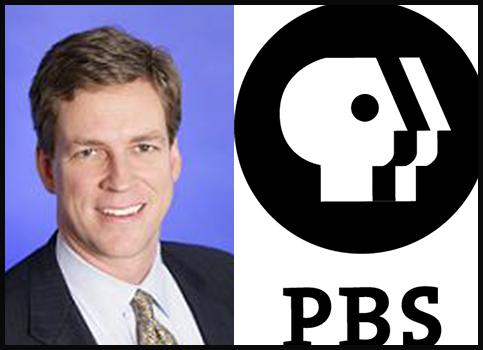The little-known chairman of the Public Broadcasting Service’s board, who works for a large contractor hired by the Corporation for Public Broadcasting, is at the center of an expansive network of public broadcasting.
Geoffrey Sands has been chairman of PBS’s board of directors since 2009 and a member of the board since 2006. He is also a director at McKinsey and Company, where he "heads the media and entertainment practice in North America" and "advises clients in the media, entertainment, and information services sector on strategy and operations," according to his McKinsey biography.
Sands also sits on the boards of two other prominent institutions with links to public broadcasting: WNET, New York City’s large public broadcasting station, and the Paley Center for Media, formerly the Museum of Television and Radio.
Sands received his undergraduate and MBA degrees from Yale and worked for the advertising agency N.W. Ayer and Son, Inc., and the consulting firm Booz Allen & Hamilton before moving to McKinsey. He did not return multiple requests for an interview.
Federal funding for public broadcasting featured prominently in the 2012 presidential campaign when Republican candidate Mitt Romney pledged to cut funding to PBS in the first debate with President Barack Obama.
"I’m going to the stop the subsidy to PBS. I’m going to stop other things. I like PBS. I love Big Bird. I actually like you, too," Romney said to debate moderator Jim Lehrer, former anchor of the PBS News Hour. "But I’m not going to keep on spending money on things to borrow money from China to pay for it."
PBS receives a portion of its budget from the Corporation for Public Broadcasting, which Congress set up to be "the steward of the federal government’s investment in public broadcasting and the largest single source of funding for public radio, television, and related online and mobile services."
CPB’s advance appropriation request for fiscal year 2015 is about $445 million.
PBS defended its work and the funding it receives from the federal government after the debate. It issued a statement saying it was "very disappointed" that Gov. Romney had threatened to cut its funding and said that cutting off crucial federal "seed money would cripple the system and bring its services to an end."
PBS president Paula Kerger called the threat of cutting the federal funding to public broadcasting "stunning" and "unbelievable."
Some of that federal money has gone to Sands’ employer: CPB hired McKinsey in 2009 and 2010 for consulting work.
CPB’s 2010 annual report lists McKinsey as receiving $395,000 for a grant classified as "digital." CPB’s 2009 annual report lists McKinsey receiving a $540,000 grant, categorized as "other system support." Both reports list the contract as going to Stamford, Connecticut; Sands works in McKinsey’s Stamford, Conn., office.
Before contracting with McKinsey in 2009—the year Sands became chairman of PBS—CPB had last hired McKinsey in 2005.
Sands, as chairman of PBS’ board, has no authority over CPB’s contracting decisions since CPB and PBS are fully separate entities. However, CPB directly provides 8.8 percent of PBS’s budget each year, said PBS spokeswoman Jan McNamara. The vast majority of CPB’s grants go to local stations, which themselves give PBS money.
McNamara, when asked how much contact PBS and CPB have, formally or informally, said, "I’d say PBS and CPB have enough contact to ensure that we are executing our missions in an effective and efficient way."
Michael Levy, CPB’s executive vice president for corporate and public affairs, assured the Free Beacon in an email there was no inappropriate contact between the PBS chairman and CPB during the contracting process.
"The CEO and the executive vice president for corporate and public affairs knew of the 2009 and 2010 contracts with McKinsey and Company. However, neither the CEO nor the executive vice president for corporate and public affairs, or any other officer of the corporation had any contact with Mr. Sands regarding these contracts," he said.
CPB hired McKinsey in 2009 and 2010 through a "competitive solicitation process," Levy emphasized. CPB’s point of contact for the 2009 and 2010 contracts was Tim Morse, and the senior vice president overseeing the contracts did not have any contact with Sands before or during the contracts, Levy noted.
While there is no evidence of any wrongdoing, the link between Sands, McKinsey, PBS, and CPB provides a window into a larger network of connections that runs through public broadcasting.
Sands also sits on the board of trustees for the Paley Center for Media, formerly the Museum of Television and Radio.
The current president and CEO of the Paley Center is Pat Mitchell, who has held her position there since 2006. She came to the Paley Center from PBS, where she worked as president and CEO for six years.
Mitchell’s replacement at PBS is Paula Kerger, who was "executive vice president and chief operating officer" at "Educational Broadcasting Corporation (EBC), the parent company of Thirteen/WNET and WLIW21 New York," according to her PBS biography.
Sands and Kerger are not the only link between PBS and WNET. Beth Hoppe, PBS’s chief programming executive, also worked at WNET as director of science programs, according to her PBS biography.
"I do think in any professional field, such as media, it’s not unusual for leaders to be acquainted," PBS’ McNamara said when asked about the connections between the different organizations.
